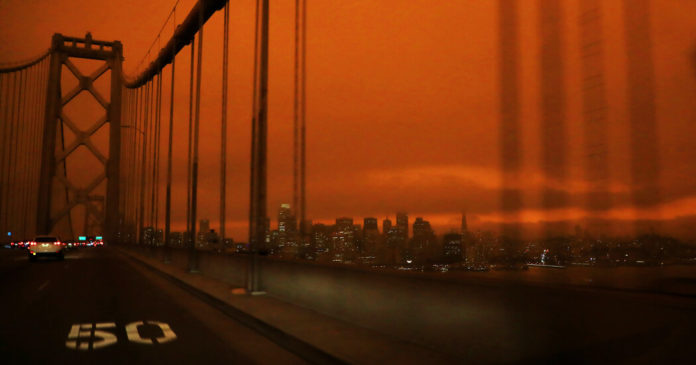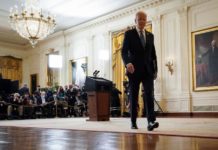Want to get The Morning by email? Here’s the sign-up.
Good morning. Trump acknowledges playing down the virus. A Homeland Security whistle-blower comes forward. And much of the American West is on fire.
In Oregon, wildfires have incinerated several communities this week, and thousands of people have evacuated their homes. In Washington State, a fire hit the town of Malden so quickly that deputies drove through the streets screaming for residents to leave. In Colorado, a 100,000-acre blaze was slowed only by a rare September snowstorm.
And in California, residents are coping with the worst wildfires on record. Smoke blotted out the sun yesterday in San Francisco, and ash fluttered down from the sky. “The sky had a faint orange glow that some said evoked a nuclear winter,” Thomas Fuller, The Times’s San Francisco bureau chief, told us. Jill Cowan, a Times reporter in Los Angeles, said, “The smoke and the poor air quality are just oppressive.”
Life across much of the American West is pretty miserable right now — and global warming is at least partly to blame. Climate change has increased the frequency of very hot days, droughts and, by extension, wildfires.
Charlie Warzel, a Times Opinion writer based in Montana, has argued that this extreme weather would receive even more attention if it were happening on the East Coast, where the nation’s capital is and much of the media is based. “I’ve wondered what coverage of climate would be like if the East really experienced how apocalyptic these feel,” he wrote. (He has also written a piece explaining what it’s like to live through a wildfire.)
And of course the pandemic has made the situation even worse. Coronavirus fears have canceled many indoor activities, like in-person school, while the wildfires and resulting pollution have made it unsafe in some places to go outdoors.
“We’re in a pandemic and a heat wave, and we don’t have air-conditioning,” Kena Hudson, a mother in Oakland, Calif., recently told CNBC. “We can’t open up the window, we’re trapped, we’re hot and no one can come over to play.”
The virus should eventually recede, so long as a vaccine arrives. But there is no vaccine in development for climate change. Which means the American West is now living through a grim version of the future, in which global warming exacts a rising toll on daily life.
The full picture: Here are a set of maps tracking the fires.
THREE MORE BIG STORIES
1. D.H.S. accused of concealing intel
A whistle-blower has accused top officials at the Department of Homeland Security of downplaying threats from violent white supremacy and Russian election interference.
Among the accusations by Brian Murphy, a high-ranking former official: Chad Wolf, the acting secretary of the department, told him not to disseminate a report on a Russian disinformation campaign to denigrate Joe Biden because it “made the president look bad.” A spokesman for the Homeland Security Department denied the accusations.
2020 campaign watch: Polls released yesterday continued to suggest that the parties’ conventions did not substantially change the race. For now, Biden leads Trump in more than enough states to win the election, with the race very close in several other states, including Florida, Georgia, Ohio and Texas. Election Day is 54 days away.
2. Trump admits he played down virus
Trump told the journalist Bob Woodward that he had purposely minimized the risks of the coronavirus to the public, despite knowing in February that the virus was much deadlier than the flu and could be spread through the air.
“I wanted to always play it down,” Trump told Woodward in March. “I still like playing it down, because I don’t want to create a panic.” The details came from Woodward’s forthcoming book, “Rage.” Biden, campaigning in Michigan, called the revelation “a life-and-death betrayal of the American people.”
For more: Here are five takeaways from the book. And our critic Jennifer Szalai writes that the book combines high-minded political journalism with a subject who has no interest in introspection.
In other virus developments:
-
The director of the National Institutes of Health assured the Senate that a vaccine would not be made available to the public unless it was safe and effective.
-
A new study shows that the virus can sometimes get into brain cells. That may explain why about half of patients report neurological symptoms, including headaches, confusion and delirium.
3. Fire destroys Greek refugee camp
On Tuesday night, a fire destroyed much of Europe’s largest refugee camp. Most of the 12,000 residents of the Moria camp on the Greek island of Lesbos — notorious for its cramped and unhygienic conditions — lost their homes in the blaze.
The cause is still unclear. Aid workers and officials said camp residents who were protesting a forced quarantine intentionally started a series of fires. Some migrants denied they would set fire to their own camp, and told the B.B.C. that the fires started after scuffles with Greek forces.
Here’s what else is happening
-
The luxury giant LVMH Moët Hennessy Louis Vuitton backed out of a deal worth more than $16 billion to buy Tiffany & Company, which would have been the biggest acquisition in the luxury sector.
-
The newest Social Progress Index, a global report card, finds that out of 163 countries, the United States, Brazil and Hungary are the only ones in which people are worse off than in 2011, Nicholas Kristof of Times Opinion writes.
-
Inside the port facility that exploded in Beirut was a “perfect bomb”: piles of fireworks, jugs of kerosene and thousands of tons of ammonium nitrate. Years of corruption and bribery allowed it to accumulate, a Times investigation found.
-
Lives Lived: George Bizos fled the Nazi occupation of his native Greece to become one of South Africa’s most prominent human rights lawyers. He may have saved Nelson Mandela from the gallows by urging him to insert three crucial words into his now-famous address from a courtroom dock in the 1960s. Bizos died at 92.
IDEA OF THE DAY: Lost learning
Whenever schools around the world manage to reopen, children in many countries will emerge from the coronavirus lockdowns having lost large amounts of classroom time.
Two economists — Eric Hanushek and Ludger Woessmann — have just published a paper that tries to quantify the costs of that lost time and lost learning. This past weekend, the O.E.C.D, the international organization that published the paper, presented the finding to education ministers from around the world. It’s a sobering piece of analysis.
“Students in grades 1-12 affected by the closures might expect some 3 percent lower income over their entire lifetimes,” Hanushek and Woessmann write, citing previous research on the economic benefits of education. “These economic losses would grow if schools are unable to restart quickly.”
They add that lower-income students are likely to face disproportionate losses, because remote learning is more difficult for them. And merely restarting schools will not erase the gaps. To do that, countries will need to put in place specific programs to help children make up for lost time.
“We are frankly concerned that nobody has been talking about these issues,” Hanushek told me.
PLAY, WATCH, EAT, DANCE
Make something comforting
This week, try a vegetarian spin on kofta curry, a saucy dish of gently spiced meatballs. It’s based on a recipe from the food writer Tejal Rao’s grandfather, though her take swaps out the meat for mashed black beans bound with bread crumbs and seasoned with ginger and herbs. It tastes delicious with some flatbread, over a bowl of rice or even in a sandwich.
Kenny Ortega, teen whisperer
The teen movie legend John Hughes gave Kenny Ortega his first shot at feature directing in “Ferris Bueller’s Day Off.” Ortega, then a choreographer and music video director, helped direct the film’s famous parade sequence.
Ortega, who’s 70, has also worked with Cher, orchestrated numbers for the Super Bowl and is the man behind Disney’s “High School Musical” movies. He’s become known as the teen whisperer, with an “unparalleled instinct for nosing out young talent and making it shine, blindingly, from the screen,” Alexis Soloski writes in a new profile.
Thanks for spending part of your morning with The Times. See you tomorrow. — David
P.S. Times Opinion is teaming up with Kara Swisher on “Sway,” a new podcast about power, featuring C.E.O.s, politicians, entrepreneurs, activists and more. The trailer is now available.
Correction: Yesterday’s newsletter misidentified the Georgia official who said that anyone found to have voted twice in the state’s primaries would be prosecuted. It was the secretary of state, not the attorney general.
You can see today’s print front page here.
Today’s episode of “The Daily” is the second of a two-part series about Breonna Taylor, who died during a police raid on her apartment in Louisville, Ky.
Lalena Fisher, Amelia Nierenberg and Sanam Yar contributed to The Morning. You can reach the team at themorning@nytimes.com.
Source : Nytimes












